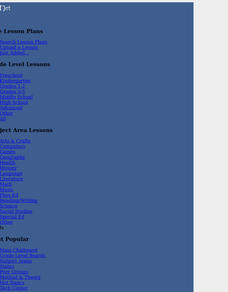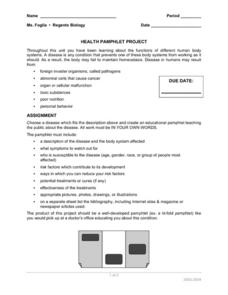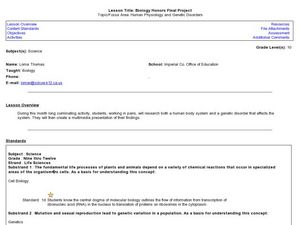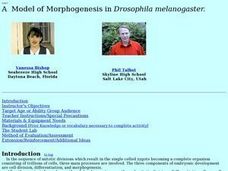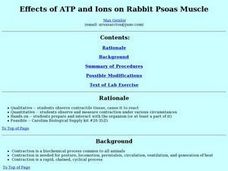Curated OER
Surface to Volume Ratios
Students measure the rate of diffusion and to calculate the surface area to volume ratios of varying cell sizes. The lesson plan is very clearly organized with a useful student worksheet provided. They perform a lab experiment which is...
Curated OER
Invertebrate Vocabulary-- Marine Invertebrate Match
In this science worksheet, students study 12 vocabulary words which pertain to marine invertebrates. Students read the definitions which include pronunciation, part of speech and meaning of the name. Students then look at 16 organisms...
Biology Junction
Cnidarians and Ctenophorans
Cnidaria is a broad phylum of 11,000 different species from jellyfish to coral. Most Cnidarians are marine species with a few freshwater examples. A lesson presentation explains the important characteristics of different species of both...
Explore Biology
Health Pamphlet Project
Biology or health nuts select a disease to research and produce a pamphlet that can be used to inform the public. The tri-fold product is worth 100 points according to the included grading page.
Curated OER
The Euglena
In this euglena worksheet, students read information about these unicellular organisms. Students then color in the different structures of the euglena on a diagram. Students complete 10 short answer questions.
Curated OER
Where Do I Belong?
Tenth graders study the diversity of life in the world. They classify and sketch organisms into the 6 kingdoms.
Curated OER
Experimentation with Teratogens on Zebrafish
High schoolers compare mitosis and meiosis with regard to chromosome number in parent cells versus daughter cells, types of cells produced, total number of cells produced, and the number of divisions. In groups, identify and...
Curated OER
COMPARE SOILS BY GROWING PLANTS
The student will identify the difference in the rate of plant growth in three soils that vary in organic matter.1. Obtain three to four flowerpots, different types of soil, a record chart, three to five beans for each pot, and water....
Curated OER
Classifying Life
In this classifying life worksheet, students review the 5 kingdoms of organisms by completing 10 matching and 7 fill in the blank questions.
Curated OER
Development Before Birth
For this development worksheet, students review the process of fertilization in placental organisms. Students determine what trimester certain events take place in a fetus' development. This worksheet has 10 fill in the blank and 7...
Curated OER
Biology Honors Final Project
Tenth graders work on a project about cellular biology and genetics. In this biology instructional activity, 10th graders research about the assigned human body system and genetic disorders that affect it. They create a multimedia...
Curated OER
Construction of a Hemoglobin Gene
Students see how eight pairs of triplets are equivalent to part of a gene and control a part of heredity. They comprehend how blood corpuscles manufacture normal hemoglobin. Students already comprehend that genes control the synthesis...
Curated OER
Using VNTR Analysis to Identify Guilt at a Crime Scene
Students collect DNA from cheek cells. They compare and contrast the processes of DNA replication and PCR. They discuss how this information can be used to determine guilt at crime scenes.
Curated OER
Taxonomy
In this biology worksheet, students complete a crossword puzzle with 39 questions on taxonomy. They identify the different classification systems used in biology.
Curated OER
Reproduction and Development
In this development worksheet, students compare the characteristics of mitosis and meiosis. Students review the male and female reproductive organs and their functions. This worksheet has 4 graphic organizer, 6 short answer, and 16 fill...
Curated OER
A Model of Morphogenesis in Drosophila Melanogaster
Students investigate the following scientific terms and ideas: rates of diffusion, the role of morphogens in the development of larva, the chemical dynamics of a cell, and the significance of embryo polarity during development.
Curated OER
Pond 1: Pond Life
Learners work together to investigate familiar and unfamiliar ecosystems. Using the internet, they discover how different organisms use their environment to satisfy their needs. They also examine the relationshiops between organisms...
Curated OER
Endocrine Histology Lab
In this endocrine histology lab, students examine prepared slides of various glands/ organs. Students identify each slide according to the key given and research materials. Students draw or sketch what is seen next to the appropriate...
Curated OER
Effects of ATP and Ions on Rabbit Psoas Muscle
Learners prepare single strands of muscle cell. They microscopically examine muscle cells and identify bands of darker and lighter proteins. They predict, observe, describe and quantify the effects of ions and ATP.
Curated OER
Science: Designer genes
Students engineer new organisms using biotechnology. In small groups, they write procedures, list benefits and drawbacks, and explain how their new organism might affect the environment. After creating their new organisms, they present...
Curated OER
Microscopes Online
In this microscopes worksheet, students access a website to complete questions about the early compound microscopes and the scientist involved in the development. This worksheet has 1 graphic organizer, 7 fill in the blank, and 10 short...
American Museum of Natural History
Microbes Coloring Book and Scavenger Hunt
Coloring pages showcase microbes—bacteria, viruses, and protists. Scholars have the option to download a coloring book and scavenger hunt or color the page directly on the computer. Three paragraphs describe each microbe.
Curated OER
Final Exam Practice - General Biology
A 17-page practice final exam for a college-level introductory biology course is contained in this resource. Matching and short answer questions cover every topic that you would expect to teach during an advanced biology course including...
American Museum of Natural History
What do You Know About Life on Earth?
Humans have only inhabited the earth for a fraction of the time that life has existed. Young scientists explore the facts about the emergence of life on Earth with an interactive resource. While highlighting different types of life, the...


